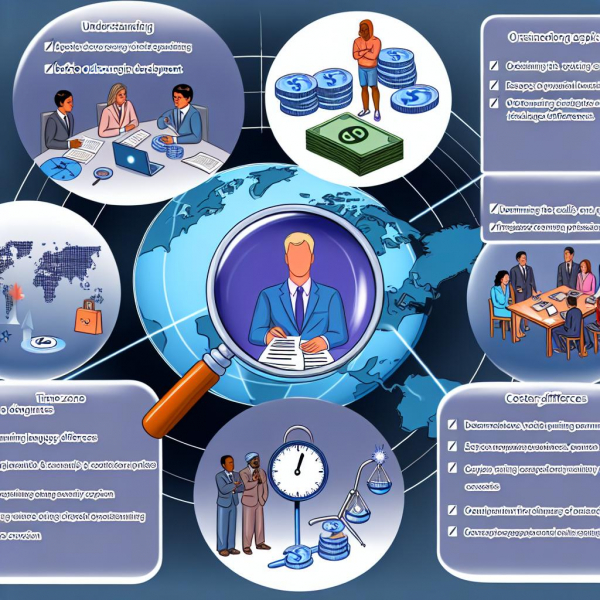As the sun sets on the horizon, casting long shadows over the bustling city, a CEO sits at his desk, staring at the screen. His company is growing, and with it, the demand for more complex software solutions. His in-house team is skilled, but stretched thin. He wonders, “Is it time to outsource development?” This question, like a persistent echo, reverberates in the minds of many business leaders. It’s a decision that could propel the company to new heights or, if ill-timed, could lead to unnecessary complications. So, when is the right time to outsource development? Let’s embark on a journey to explore this question, navigating through the intricate maze of business growth, technological demands, and resource management.
Table of Contents
- Understanding the Concept of Outsourcing Development
- The Pros and Cons of Outsourcing Development
- Identifying the Right Time to Outsource Development
- Factors to Consider Before Outsourcing Development
- Choosing the Right Outsourcing Partner for Development
- Maximizing the Benefits of Outsourcing Development
- Avoiding Common Pitfalls in Outsourcing Development
- Q&A
- Concluding Remarks

Understanding the Concept of Outsourcing Development
Outsourcing development is a strategic move that many businesses are adopting to leverage the expertise and resources of external teams. This approach allows companies to focus on their core competencies while delegating specific tasks or projects to specialized service providers. However, the question that often arises is, when is the right time to outsource development?
There are several indicators that can signal the need for outsourcing. Resource constraints is one such indicator. If your in-house team is stretched thin and unable to handle additional projects, it might be time to consider outsourcing. Another sign is when you need specialized skills that your current team lacks. Instead of investing time and resources in training, outsourcing can provide immediate access to experts in the field. Additionally, if you’re looking to reduce operational costs, outsourcing can be a cost-effective solution. Here’s a simple table to illustrate these points:
| Indicator | Explanation |
|---|---|
| Resource Constraints | Your in-house team is overworked and cannot handle additional projects. |
| Specialized Skills | You need expertise that your current team lacks and training them would be time-consuming and costly. |
| Reduce Operational Costs | Outsourcing can be a cost-effective solution to manage your budget and resources efficiently. |
Remember, the decision to outsource should not be taken lightly. It requires careful consideration and planning. But when done right, it can provide significant benefits and drive your business forward.

The Pros and Cons of Outsourcing Development
When it comes to software development, many companies are faced with the decision of whether to keep the process in-house or outsource it. Both options come with their own set of advantages and disadvantages. Outsourcing development can be a strategic move that saves time, money, and resources. However, it also comes with its own set of challenges.
One of the main advantages of outsourcing development is the potential for cost savings. By outsourcing, companies can avoid the overhead costs associated with hiring and training a full-time development team. Additionally, outsourcing can provide access to a larger pool of talent and expertise that may not be available locally. On the other hand, one of the main disadvantages is the potential for communication and cultural barriers. These can lead to misunderstandings and delays in the development process. Furthermore, when outsourcing, companies may have less control over the development process and final product.
| Pros of Outsourcing Development | Cons of Outsourcing Development |
|---|---|
| Cost savings | Potential communication and cultural barriers |
| Access to a larger pool of talent and expertise | Less control over the development process and final product |
Ultimately, the decision to outsource development should be based on a company’s specific needs and circumstances. It’s important to carefully weigh the pros and cons, and consider factors such as the complexity of the project, the company’s budget, and the availability of local talent. There is no one-size-fits-all answer to the question of whether to outsource development. Each company must make the decision that is best for its unique situation.

Identifying the Right Time to Outsource Development
When it comes to software development, one of the most critical decisions a business has to make is whether to keep the process in-house or outsource it. This decision can significantly impact the project’s success, the company’s bottom line, and the overall business strategy. However, identifying the right time to outsource can be a challenging task. There are several key indicators that can help you make this decision.
Firstly, lack of in-house expertise is a clear sign that outsourcing might be the best option. If your team lacks the necessary skills or experience to complete the project successfully, outsourcing can provide access to a pool of experts who can deliver high-quality work. Secondly, if you’re facing time constraints, outsourcing can help speed up the development process. An external team can work on your project around the clock, ensuring that it’s completed on time. Lastly, if your budget is limited, outsourcing can often be a more cost-effective solution. You can avoid the costs associated with hiring and training new employees, and instead pay a fixed price for the project.
| Indicator | Reason to Outsource |
|---|---|
| Lack of in-house expertise | Access to a pool of experts |
| Time constraints | Speed up the development process |
| Limited budget | Cost-effective solution |
Remember, the decision to outsource should not be taken lightly. It’s essential to carefully consider your business needs, project requirements, and potential outsourcing partners before making a decision. By keeping these indicators in mind, you can identify the right time to outsource and ensure the success of your software development project.

Factors to Consider Before Outsourcing Development
Before you decide to outsource your development, there are several factors you need to consider. The first is cost. Outsourcing can be a cost-effective solution, but it’s important to understand the full financial implications. This includes not only the cost of the outsourcing service itself, but also any additional expenses such as training or management. It’s also crucial to consider the quality of the work. While many outsourcing companies offer high-quality services, this is not always the case. Therefore, it’s important to do your research and choose a reputable company.
Another key factor is communication. When you outsource, you’ll be working with a team that may be located in a different time zone or country. This can lead to communication challenges, so it’s important to have a clear communication plan in place. Additionally, consider the security implications. Outsourcing can potentially expose your company’s sensitive data to third parties, so it’s crucial to ensure that the outsourcing company has robust security measures in place. Finally, consider the impact on your team. Outsourcing can free up your internal team to focus on core business activities, but it can also lead to job insecurity and lower morale among your staff.
| Factor | Consideration |
| Cost | Understand the full financial implications, including additional expenses. |
| Quality | Research and choose a reputable outsourcing company. |
| Communication | Have a clear communication plan in place. |
| Security | Ensure the outsourcing company has robust security measures. |
| Impact on your team | Consider the potential impact on job security and morale. |
Choosing the Right Outsourcing Partner for Development
When it comes to software development, many businesses are turning to outsourcing as a cost-effective and efficient solution. However, choosing the right outsourcing partner is crucial to ensure the success of your project. There are several factors to consider when making this decision, including the company’s expertise, communication skills, and track record.
Firstly, it’s important to assess the potential partner’s technical expertise. They should have a deep understanding of the technologies and platforms relevant to your project. You can evaluate this by looking at their portfolio, asking about their development process, and checking their certifications. Secondly, communication is key in any partnership. The company should be able to communicate effectively in English, provide regular updates, and be responsive to your queries. Lastly, consider their track record. Look at their previous projects, client testimonials, and success rates to gauge their reliability and quality of work.
| Factor | Description |
|---|---|
| Technical Expertise | Understanding of relevant technologies and platforms |
| Communication | Ability to communicate effectively and provide regular updates |
| Track Record | Previous projects, client testimonials, and success rates |
Remember, the right outsourcing partner can not only help you save costs but also bring in fresh perspectives, innovative solutions, and a wealth of experience to your project. So, take your time, do your research, and choose wisely.
Maximizing the Benefits of Outsourcing Development
Outsourcing development can be a game-changer for businesses looking to scale up, reduce costs, and access a wider pool of talent. However, knowing when to take this step is crucial. Timing is everything when it comes to outsourcing. If done too early, you may not have a clear understanding of your business needs. If done too late, you may miss out on the benefits of outsourcing.
There are several signs that it might be the right time to outsource development. These include:
- When you need specialized skills: If your project requires expertise that your in-house team lacks, outsourcing can be a great solution. This allows you to tap into a global talent pool and find the right skills for your project.
- When you need to scale quickly: If your business is growing rapidly and you need to scale your development team quickly, outsourcing can provide a flexible solution. You can easily increase or decrease the size of your outsourced team as needed.
- When you want to focus on core business activities: If you find that development work is taking up too much of your team’s time and distracting them from core business activities, outsourcing can help. By delegating development work to an external team, your in-house team can focus on what they do best.
However, it’s important to remember that outsourcing is not a one-size-fits-all solution. The decision to outsource should be based on your unique business needs and circumstances. To help you make an informed decision, here’s a simple table comparing the pros and cons of outsourcing:
| Pros of Outsourcing | Cons of Outsourcing |
|---|---|
| Access to a global talent pool | Potential communication challenges |
| Cost savings | Possible loss of control over the project |
| Ability to scale quickly | Dependence on an external team |
Ultimately, the right time to outsource development is when the benefits outweigh the potential challenges. By carefully considering your business needs and the pros and cons of outsourcing, you can make a decision that supports your business growth and success.
Avoiding Common Pitfalls in Outsourcing Development
Outsourcing development can be a game-changer for your business, but it’s not without its pitfalls. One of the most common mistakes is not choosing the right time to outsource. It’s crucial to understand that outsourcing is not a quick fix for a problem, but a strategic decision that should be made at the right time. Timing is everything when it comes to outsourcing development.
There are a few key indicators that it might be the right time to outsource. These include:
- When you need specialized skills: If your project requires expertise that your in-house team lacks, it might be time to outsource.
- When you need to scale quickly: If your business is growing rapidly and you need to scale your development team quickly, outsourcing can be a great solution.
- When you want to focus on core business functions: If development is not a core part of your business, outsourcing can free up your team to focus on what they do best.
However, it’s also important to avoid outsourcing at the wrong time. For example, if your in-house team is already overwhelmed with work, adding the management of an outsourced team to their plate can lead to burnout and decreased productivity. Similarly, if you’re not clear on your project requirements, outsourcing can lead to miscommunication and wasted resources.
Here’s a simple table to help you decide when to outsource:
| Reason for Outsourcing | Right Time | Wrong Time |
|---|---|---|
| Need specialized skills | Your project requires expertise that your in-house team lacks | Your in-house team has the necessary skills |
| Need to scale quickly | Your business is growing rapidly | Your business is stable or shrinking |
| Focus on core business functions | Development is not a core part of your business | Development is a core part of your business |
Q&A
Q: What does it mean to outsource development?
A: Outsourcing development refers to the practice of hiring external resources, often from different countries, to handle certain aspects of a business’s operations, such as software development, web development, or app development.
Q: Is there a specific time when a business should consider outsourcing development?
A: There isn’t a one-size-fits-all answer to this question. The right time to outsource development varies from business to business, depending on factors like growth stage, financial resources, in-house expertise, and project requirements.
Q: What are some signs that it might be the right time to outsource development?
A: Some signs include: when you need to speed up product development, when you lack the necessary in-house expertise, when you want to focus on core business functions, or when you’re looking to cut costs without compromising on quality.
Q: Is outsourcing development a good idea for startups?
A: Yes, outsourcing can be particularly beneficial for startups. It allows them to access high-level expertise and advanced technology without the need for large upfront investments. It also enables them to stay lean and agile, which is crucial in the early stages of a business.
Q: What are the potential downsides of outsourcing development?
A: Some potential downsides include communication challenges due to language or cultural differences, lack of control over the development process, and potential risks to data security. However, these risks can be mitigated with careful planning and management.
Q: How can a business ensure a successful outsourcing partnership?
A: Clear communication, setting realistic expectations, and establishing a strong working relationship are key. It’s also important to choose an outsourcing partner who understands your business goals, has a proven track record, and can provide the specific services you need.
Q: Can outsourcing development lead to cost savings?
A: Yes, outsourcing can lead to significant cost savings. It eliminates the need for hiring, training, and maintaining an in-house team, and it often means you’re only paying for the services you need, when you need them. However, it’s important to consider the total cost of outsourcing, including any potential hidden costs.
Q: Is it possible to outsource development to any country?
A: Technically, yes. However, it’s important to consider factors like time zone differences, language barriers, cultural differences, and the country’s technological infrastructure. Countries like India, Ukraine, and the Philippines are popular outsourcing destinations due to their large pool of skilled developers and competitive rates.
Concluding Remarks
In the grand tapestry of business, outsourcing development is a thread that can weave a path to success or unravel into a tangle of complications. The right time to pull this thread is not etched in stone, but rather, it is a decision that should be carefully stitched into the fabric of your business strategy. It’s a choice that depends on your unique business landscape, your resources, and your vision for the future. So, as the sun sets on our exploration of outsourcing development, remember that the decision to outsource is not a one-size-fits-all solution. It’s a strategic move, a calculated risk, a leap of faith. It’s a journey that begins with a single step, and only you can decide when the time is right to take it.
